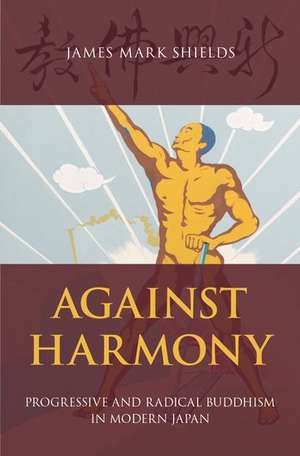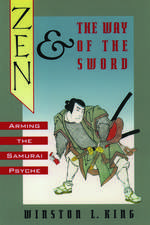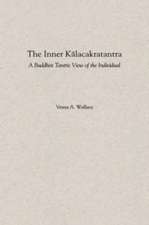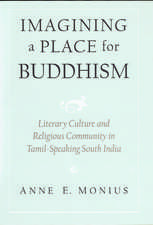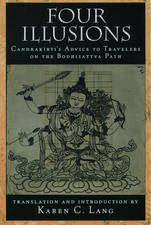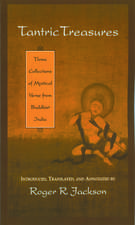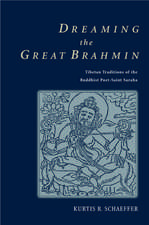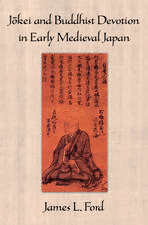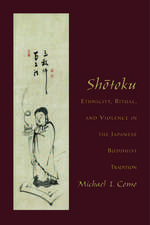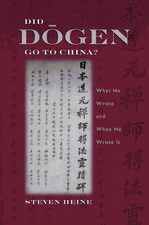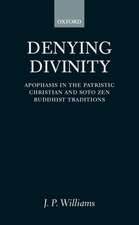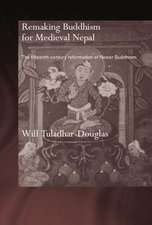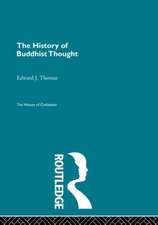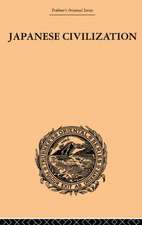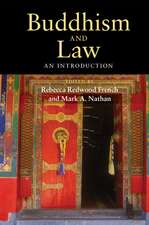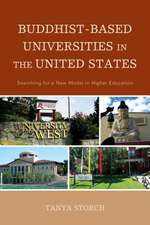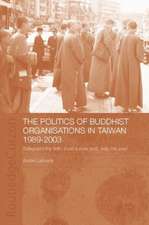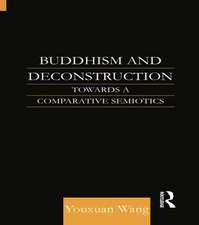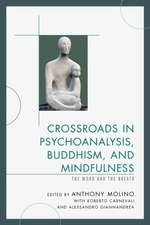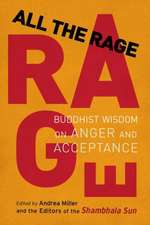Against Harmony: Progressive and Radical Buddhism in Modern Japan
Autor James Mark Shieldsen Limba Engleză Hardback – 8 iun 2017
Preț: 718.19 lei
Preț vechi: 1029.82 lei
-30% Nou
Puncte Express: 1077
Preț estimativ în valută:
137.43€ • 146.96$ • 114.58£
137.43€ • 146.96$ • 114.58£
Carte tipărită la comandă
Livrare economică 07-14 aprilie
Preluare comenzi: 021 569.72.76
Specificații
ISBN-13: 9780190664008
ISBN-10: 0190664002
Pagini: 416
Dimensiuni: 236 x 157 x 33 mm
Greutate: 0.68 kg
Editura: Oxford University Press
Colecția OUP USA
Locul publicării:New York, United States
ISBN-10: 0190664002
Pagini: 416
Dimensiuni: 236 x 157 x 33 mm
Greutate: 0.68 kg
Editura: Oxford University Press
Colecția OUP USA
Locul publicării:New York, United States
Recenzii
an inevitable point of reference for future studies of modern Japanese Buddhism.
Although not a lengthy read, the depth and range of the book is remarkable, and it does convincing work in portraying the modern period of Japanese Buddhism in a more nuanced light than the ordinary student of Japanese Buddhism is accustomed to. It is thus highly recommended to those specializing in the history of ideas of modern Japan and, in general, to all students of Buddhist modernism.
a standard reference to a critically important part of Japan's modernizing history that will be required reading for years to come in graduate seminars and upper-division courses.
[Shields] persuasively shows that Buddhists experienced Japanese modernity in multifarious ways. He furthermore proves that many prominent Buddhists had demonstrable commitments to principles that we would regard today as 'leftist.'
James Mark Shields has made an important contribution to several fields, including Buddhist Ethics. More often than not, scholarship on Japanese Buddhist ethics focuses on the pre-modern period, especially the writings of the founders of Japanese denominations (such figures as Saichō, Kūkai, Hōnen, Shinran, Eisai, Dōgen, and Nichiren). As a result, the richness of Japanese Buddhist ethics since the mid-19th century has been relatively overlooked. In this respect, with Against Harmony Mark Shields has filled a void.
James Mark Shields's new book provides a comprehensive and insightful analysis of Japanese Buddhist modernism by focusing thoughtfully on a fifty-year period lasting from 1885-1935, during which the tradition sought various ways of reforming itself in relation to domestic sociopolitical challenges and the impact of Western influences and ideologies. This exceptionally well-researched and eminently readable volume brings to light many previously overlooked Japanese sources cast in terms of global perspectives.
In this groundbreaking book Shields offers a rich analysis of progressive and radical Buddhists in the decades leading up to World War Two. His theoretical acumen, firm grasp of modern Japanese history, incisive treatment of Marxist thought, and problematizing of constructs like nationalism, fascism, and modernity will benefit readers far beyond the confines of Buddhist Studies.
The past few years have seen an explosion of insightful research on religion in the modern period (late nineteenth through early twentieth century) in Japan. Against Harmony is an important addition to this re-examination, taking a philosophical approach to how influential Buddhist figuresfrom Inoue Enryo to Senoo Giroresponded, philosophically and socially, to the challenges of the modern world.
Although not a lengthy read, the depth and range of the book is remarkable, and it does convincing work in portraying the modern period of Japanese Buddhism in a more nuanced light than the ordinary student of Japanese Buddhism is accustomed to. It is thus highly recommended to those specializing in the history of ideas of modern Japan and, in general, to all students of Buddhist modernism.
a standard reference to a critically important part of Japan's modernizing history that will be required reading for years to come in graduate seminars and upper-division courses.
[Shields] persuasively shows that Buddhists experienced Japanese modernity in multifarious ways. He furthermore proves that many prominent Buddhists had demonstrable commitments to principles that we would regard today as 'leftist.'
James Mark Shields has made an important contribution to several fields, including Buddhist Ethics. More often than not, scholarship on Japanese Buddhist ethics focuses on the pre-modern period, especially the writings of the founders of Japanese denominations (such figures as Saichō, Kūkai, Hōnen, Shinran, Eisai, Dōgen, and Nichiren). As a result, the richness of Japanese Buddhist ethics since the mid-19th century has been relatively overlooked. In this respect, with Against Harmony Mark Shields has filled a void.
James Mark Shields's new book provides a comprehensive and insightful analysis of Japanese Buddhist modernism by focusing thoughtfully on a fifty-year period lasting from 1885-1935, during which the tradition sought various ways of reforming itself in relation to domestic sociopolitical challenges and the impact of Western influences and ideologies. This exceptionally well-researched and eminently readable volume brings to light many previously overlooked Japanese sources cast in terms of global perspectives.
In this groundbreaking book Shields offers a rich analysis of progressive and radical Buddhists in the decades leading up to World War Two. His theoretical acumen, firm grasp of modern Japanese history, incisive treatment of Marxist thought, and problematizing of constructs like nationalism, fascism, and modernity will benefit readers far beyond the confines of Buddhist Studies.
The past few years have seen an explosion of insightful research on religion in the modern period (late nineteenth through early twentieth century) in Japan. Against Harmony is an important addition to this re-examination, taking a philosophical approach to how influential Buddhist figuresfrom Inoue Enryo to Senoo Giroresponded, philosophically and socially, to the challenges of the modern world.
Notă biografică
James Mark Shields is Associate Professor of Comparative Humanities and Asian Thought at Bucknell University.
